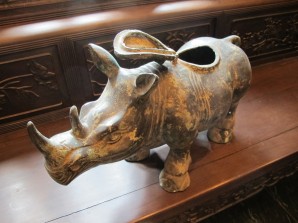

An antique bronze urn for storing medicine in HCMC’s Traditional Medicine Museum. A new trend in Vietnam of buying rhino horn as a gift with the primary motivation to enhance social standing has emerged. Medical motivations are secondary. Photo by Mic Smith
The research also shows there is a large group of people beyond the current buyers who intend to buy rhino horn (known as sung te giac in Vietnamese) in the future.
“Intenders want to become buyers and users of rhino horn as it is favoured and valued by those they want to impress,” Dr Naomi Doak of TRAFFIC’s Greater Mekong Programme says.
“They have already made a conscious decision to purchase rhino horn even though they know it is illegal,” Dr Doak says.
The consumers are wealthy, powerful influential people within Vietnamese society, says Dr Jo Shaw, WWF-SA’s Rhino Co-ordinator.
“While their reasons for purchasing and consuming rhino horn are linked to an underlying belief in its medicinal properties there is a current trend of use to enhance social standing,” Dr Shaw says.
The primary motivation to buy or use is linked to how rhino horn makes people feel rather than any function such as medicinal, Dr Doak says.
Interviews of 720 people were conducted earlier this year by a consumer research firm with an international reputation by local staff in Vietnamese.
“Despite the illegal nature of this issue we have not really experienced any reluctance of people to discuss the issue,” Dr Doak says adding that the survey was anonymous and none of the data is being used for enforcement.
The survey indicated that rhino horn use in Vietnam’s two biggest cities is not widespread, she says.
“The information from the random sample shows only a very small percentage of the people interviewed admitted to being either consumers or buyers.”
According to the research buyers and users are generally successful, well-educated urban males who value their luxury lifestyle, which is often based around meeting peer group pressures.
Dr Shaw says buyers generally lack emotional connection with the animals that suffer from the illegal trade.
“[They] tend to view animals as commodities to serve functional and income-generating purposes rather than feeling an emotional connection.”
“The objective of the research was to try and gather some information on what the key motivators for consumption currently are as a basis for the design of a targeted campaign to change behaviour and reduce demand,” Dr Doak says.
She says the rhino poaching situation is worsening across in rhino range across Africa and Asia, but it’s impossible to say if it’s due directly to consumption in Viet Nam as there may be other countries or other factors involved.
“What we do know is that if current poaching rates continue we will hit 1000 animals killed in South Africa this year and at that point deaths will out number births and we will be at a tipping point for these animals.”
